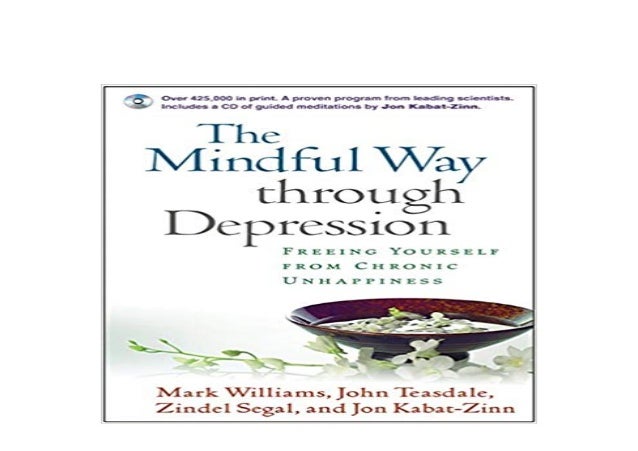

See also the authors' Mindful Way Workbook, which provides step-by-step guidance for building your mindfulness practice in 8 weeks. If youve ever struggled with depression or know someone who has, take heart: mindfulness practice is a simple, powerful way to naturally break depressions.
#THE MINDFUL WAY THROUGH DEPRESSION FREE#
Jon Kabat-Zinn gently and encouragingly narrates the accompanying CD of guided meditations (also available as free audio downloads for purchasers), making this a complete package for anyone seeking to regain a sense of hope and well-being.
#THE MINDFUL WAY THROUGH DEPRESSION HOW TO#
Through insightful lessons drawn from both Eastern meditative traditions and cognitive therapy, they demonstrate how to sidestep the mental habits that lead to despair, including rumination and self-blame, so you can face life's challenges with greater resilience.

In The Mindful Way through Depression, four uniquely qualified experts explain why our usual attempts to “think our way out of a bad mood or just “snap out of it lead us deeper into the downward spiral. Mindfulness, a simple yet powerful way of paying attention to your most difficult emotions and life experiences, can help you break the cycle of chronic unhappiness once and for all. “It becomes less about a treatment, and more about a way of life and looking after themselves,” he concludes.If you've ever struggled with depression, take heart. Segal says 75 to 80 per cent of patients continue the mindfulness practice following their training. Studies in recent years have shown MBCT to be 43 per cent effective in reducing relapse in sufferers of depression-as effective as antidepressants. He describes mindfulnessas a way to allow patients more room and more space to handle their depression in this Tedx Talk. Getting well is half of the problem, staying well is the other half. While someone without mindfulness training may feel overwhelmed, a person who has a mindfulness practice experiences a healthier, more substantial way of dealing with the emotion. What we now understand about depression is that it is an episodic and recurrent disorder, he says. Over time, those who have had mindfulness training can change their reaction to sadness. “Instead, they can find a different place for standing and working with these feelings, and as a result have much more of an option for selecting a response and influencing what happens next.” COUPON: RENT The Mindful Way Through Depression Freeing Yourself from Chronic Unhappiness 1st edition (9781593851286) and save up to 80 on textbook.

“What we’re trying to get people to do is to anchor themselves in their experience so that when a negative emotion comes up in the mind, it can wash over them it doesn’t totally destabilize,” Segal says. Inspired by Jon Kabat-Zinn’s work with mindfulness and chronic pain, they built off of his eight-week program to create mindfulness-based cognitive therapy, or MBCT. We’re bringing our attention into the present moment and we’re not judging,” Segal explains. “Mindfulness is really the awareness that comes to mind, the awareness that arises when we pay attention in a particular way. What we really needed to do was to help people develop a different relationship to their sadness.” “We weren’t interested in trying to eliminate sadness, we weren’t interested in trying to get people not to feel sad. What we really needed to do was to help people develop a different relationship to their sadness.” The Mindful Way Through Depression is a well explained self help book for guiding yourself through depression using mindfulness practices and meditation.

“But how do you work with a trigger of relapse like sadness, when sadness is also a feature of our universal human experience?” Segal asks. They decided to focus on a specific trigger, such as sadness. Segal partnered with two other researchers, Mark Williams and John Teasdale, to find a way to modify existing treatment to prevent relapse. Understanding the Impact of Mindfulness on Depression


 0 kommentar(er)
0 kommentar(er)
